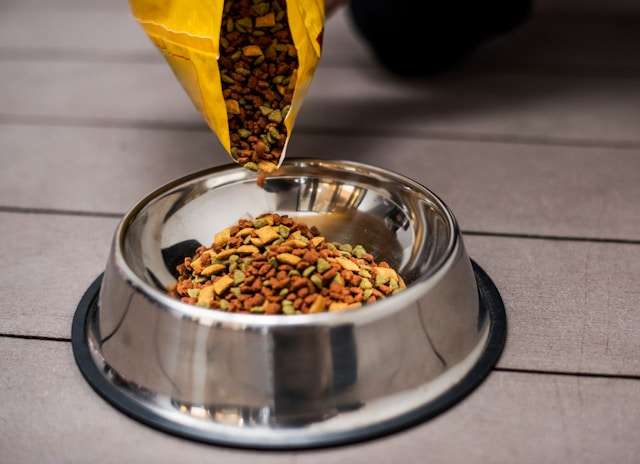Best Puppy Food: Top Picks for Your Furry Friend’s Health

Best Puppy Food: Top Picks for Your Furry Friend’s Health. Picking the right food for your new furry friend can be overwhelming.
With so many options, how do you know what’s best for your pup? I’ve been there, and I’m here to help you navigate the world of puppy nutrition.
The best puppy food offers balanced nutrition. It should match your puppy’s size, breed, and growth needs. It should have high-quality protein, essential fatty acids, and a mix of vitamins and minerals. It supports healthy growth. But don’t worry, I’ll break it down for you in simple terms.
There’s a perfect match for your puppy. It could be dry kibble, wet food, or fresh options. And guess what? It doesn’t always have to break the bank. Let’s explore what makes puppy food special. We’ll also discuss how to choose the best one for your little tail-wagger.
Key Takeaways
- Choose puppy food based on your pup’s size, breed, and nutritional needs.
- Look for high-quality protein sources and essential nutrients for healthy growth.
- Choose between dry, wet, or fresh food. Consider your budget and lifestyle.
What Makes up the Best Puppy Food?
Picking the right food for your pup is crucial. Let’s explore the qualities that make puppy food exceptional!
Understanding Nutritional Needs
When I look for the best puppy food, I always check the protein content first. Puppies need lots of protein to grow strong muscles. Most experts recommend at least 22% protein for puppies.
Fat is another key nutrient. It gives puppies the energy to play and learn. I aim for foods with about 8% fat.
Don’t forget about carbs! They provide quick energy. But too many can lead to weight gain. I look for foods with moderate carb levels.
Vitamins and minerals are essential too. Calcium helps build strong bones. DHA supports brain development. And antioxidants boost the immune system.
Compliance with AAFCO standards.
The Association of American Feed Control Officials (AAFCO) sets standards for pet food. I always check for its seal of approval.
AAFCO has two main statements:
- “Complete and balanced for growth.”
- “Complete and balanced for all life stages.”
Either one is good for puppies. These statements mean that the food meets basic nutritional needs.
AAFCO also requires feeding trials for some foods. These trials prove that the food supports healthy growth.
Importance of High-Quality Ingredients
I’m a stickler for quality ingredients. The best puppy foods use real meat as the first ingredient. Chicken, beef, or fish is a great option.
Avoid foods with lots of fillers or by-products. These don’t provide much nutrition.
Human-grade ingredients are a big plus.
They’re safer and often more nutritious.
I also look for natural preservatives, like vitamin E. They’re better than artificial ones.
Whole grains can be good for puppies. They provide fiber and nutrients. But some pups might be sensitive to grains.
Remember, every puppy is unique. What works for one might not work for another. Always check with your vet if you’re unsure!
Comparing Types of Puppy Food
Choosing the right food for your puppy can be tricky. Let’s look at the main types of puppy food and what makes each unique.
Dry vs. Wet Puppy Food
When it comes to dry puppy food, I’m a big fan of its convenience. It’s easy to store, and it has a long shelf life. Plus, it helps keep your pup’s teeth clean. But wet food has its perks, too!
Wet puppy food is more appealing to picky eaters. It’s packed with moisture, which is great for keeping your little friend hydrated. Yet, it can be pricier and doesn’t last as long once opened.
Specialized Diets: Grain-Free and Fresh Options
Have you heard about grain-free puppy food? It’s become pretty popular! Some pups do better without grains in their diet. But remember, not all puppies need grain-free food.
Fresh dog food options like Nom Nom chicken cuisine are gaining fans, too. These foods are often more nutrient-dense. They can be a great choice for puppies with sensitive tummies.
When picking a specialized diet, always chat with your vet first. They can help you choose the best option for your furry friend’s unique needs.
Selecting food based on puppy size and breed.
Feeding your puppy the right food is crucial for its growth and health. Let’s look at how to choose the best food for small and large-breed puppies.
Small Breed Puppy Nutritional Considerations
Small breed puppies have unique needs. They grow fast and have tiny tummies, so they need nutrient-dense food. I recommend looking for small-breed puppy food with:
- High protein (25-30%).
- Higher fat content (15-20%).
- Smaller kibble sizes
These pups have quick metabolisms, so they need frequent meals, feeding them 3-4 times a day.
Omega fatty acids are great for their coats and brain development. I always check the label for DHA, an important omega-3.
Large Breed Puppy Nutritional Considerations
Big puppies grow slower but for longer. They need food that supports steady growth to avoid joint issues. When I pick large-breed puppy food, I look for:
- Moderate protein (22-26%)
- Lower fat (12-15%)
- Controlled calcium levels
Calcium is tricky for big pups. Too much can cause bone problems. I aim for foods with about 1.2% calcium.
Glucosamine is great for joint health. Many large-breed foods include it, which is a plus.
I feed large-breed puppies 2-3 times a day. They don’t need as many meals as their smaller cousins.
Feeding Your Puppy for Optimal Health
I know how important it is to give your puppy the best start in life. Let’s talk about the key aspects of feeding your furry friend for its health and growth.
Promoting Digestive and Immune Health
Did you know that a healthy gut is crucial for your pup’s well-being? I always recommend puppy food with probiotics and prebiotics. These helpful bacteria and fibers work wonders for your little one’s tummy.
Prebiotic fiber is like a superfood for good gut bacteria. It helps them thrive and keeps your puppy’s digestion smooth. I’ve seen amazing results with puppies that eat foods rich in these ingredients.
What about the immune system? It has a strong connection to gut health. Feeding your pup nutrient-dense kibble boosts its immune defenses. It’s packed with essential vitamins and minerals. I always look for foods with antioxidants, like vitamins E and C. They protect your puppy’s cells!
Supporting Development and Growth
Growing puppies need lots of energy and the right nutrients. I’m always excited to talk about DHA – it’s a superstar for brain development! Foods with fish oil are great sources of this important nutrient.
For strong muscles, I recommend puppy food high in protein. Look for options where meat is the first ingredient. Your pup will thank you with boundless energy and playfulness!
Don’t forget about those growing bones. Calcium and phosphorus are must-haves. I’ve found that puppy-specific formulas usually have the right balance of these minerals.
Remember, every puppy is unique. Keep an eye on their growth and adjust their food as needed. A shiny coat and bright eyes are good signs you’re on the right track!
Brand and Budget Considerations
Choosing the right puppy food can be tricky, but I’ve got you covered! Let’s talk about how to read those confusing labels and find great food without breaking the bank.
Decoding Dog Food Labels and Brands
Ever feel like you need a decoder ring for dog food labels? You’re not alone! I always look for brands that list real meat as the first ingredient. I love Blue Buffalo Life Protection Formula and Hill’s Science Diet Puppy. They are two top-notch options.
But wait, there’s more! I check for:
- Named protein sources (like “chicken,” not “meat”)
- No artificial preservatives or colors.
- Added vitamins and minerals.
Remember, fancy packaging doesn’t always mean better food. I’ve found some great budget-friendly options that provide significant nutritional value.
Finding affordable, high-quality food
Who says you can’t feed your pup well on a budget? I’ve discovered some awesome tricks! Brands like Purina One SmartBlend and Nutro Natural Choice offer low-cost, nutritious food.
Here’s my money-saving checklist:
- Buy in bulk when there’s a sale.
- Look for store brands (they’re often made by big names).
- Check online for deals and subscriptions.
Don’t forget to peek at the Dog Food Advisor for reviews. I’ve found some hidden gems there! And remember, a little extra spent on good food now can save on vet bills later. Your wallet (and your pup) will thank you!
Puppy Food for Special Diets and Sensitivities
Some puppies need special diets due to food sensitivities or health issues. Let’s explore how to identify these needs and work with vets to find the right food.
Identifying and Catering to Food Sensitivities
Is your puppy scratching a lot or having tummy troubles? It might have a food sensitivity. I’ve seen many pups thrive on special diets.
Here are common signs of food sensitivities:
- Itchy skin or ear infections.
- Vomiting or diarrhea.
- Gassiness or bloating.
For sensitive tummies, I recommend trying puppy food made for sensitive stomachs. These often have simple ingredients and avoid common allergens.
Look for foods with:
- Limited ingredients
- Novel protein sources (like duck or salmon).
- No artificial colors or flavors.
- Higher-quality ingredients.
A food with 28-32% protein is usually good for puppies with sensitivities. Always check the protein percentage on the label!
The Role of Veterinarians in Diet Selection
Your vet is your best friend when it comes to picking the right food for your pup. They can help pinpoint exactly what is causing issues.
Vets can:
- Run tests to identify specific allergies.
- Recommend prescription diets if needed.
- Help you to understand nutritional needs
I always tell pet parents to consult their vet before making big diet changes. The World Small Animal Veterinary Association has great guidelines for choosing pet food.
Remember, premium puppy food isn’t always the best. What matters is finding a food that meets your pup’s unique needs. With a little patience and help from your vet, you’ll find the perfect fit!
Frequently Asked Questions
Let’s dive into some common questions about puppy food. I’ve gathered info from vets and pet nutrition experts. It will help you make the best choices for your furry friend.
What are the vet-approved options for puppy nutrition?
Vets often recommend brands like Purina, Royal Canin, and Hill’s for puppy nutrition. These brands have a solid reputation for quality ingredients and balanced nutrition.
Many vets rank foods with high-quality protein and added DHA for brain development.
It’s always a good idea to chat with your own vet about your pup’s specific needs.
When it comes to large-breed puppies, which food brands receive strong recommendations?
Large-breed puppies have unique nutritional needs. They need food that supports healthy growth without encouraging too-rapid weight gain.
Many experts recommend foods with balanced calcium for proper bone growth. Brands like Purina Pro Plan Large Breed Puppy and Royal Canin Large Puppy often get the thumbs-up.
Can you suggest top-rated dry food formulas for puppies?
Dry food is super convenient, and there are lots of great options out there. I’ve done some digging and found a few standouts.
The Dog Food Advisor rates Wellness Complete and Instinct Original as top dog foods. These brands offer balanced nutrition with high-quality ingredients.
What are some excellent food choices for small-breed puppies?
Small breed puppies have tiny tummies but big energy needs. They benefit from nutrient-dense foods with smaller kibble sizes.
I often see recommendations for two dog foods: Royal Canin Small Puppy and Hill’s Science Diet Small Breed Puppy. These foods pack a lot of nutrition into small, easy-to-eat pieces.
Where can I find quality puppy food that won’t break the bank?
Good nutrition doesn’t have to cost a fortune. I’ve discovered some budget-friendly options that don’t skimp on quality.
Iams Puppy and Purina One Puppy Formula are good, cheap options. They offer solid nutrition. Remember, buying in bulk can also help save some cash.
Are there any health-packed homemade recipes suitable for a growing puppy?
Homemade puppy food can be a great option if done right. Ensure that the balance of the recipe. They must meet your pup’s nutritional needs.
I’d suggest consulting with a vet or canine nutritionist before trying homemade diets. They can help you make recipes with the right balance of protein, fats, and nutrients for your growing pup.







